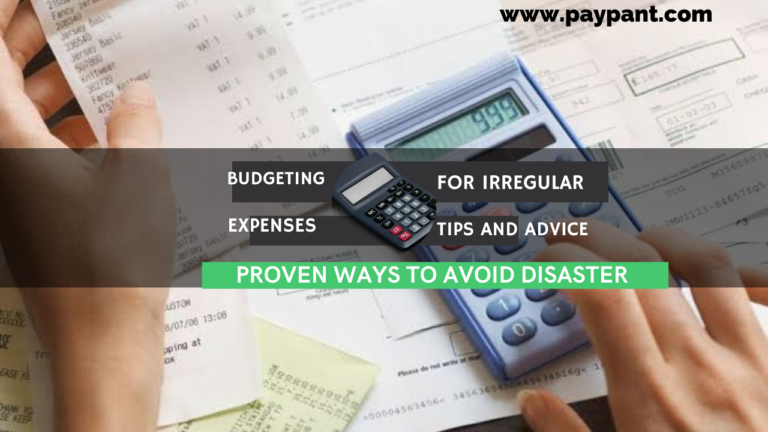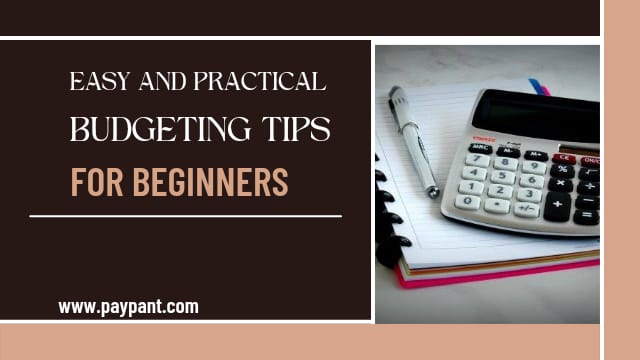Last updated Mar. 5, 2023 by Peter Jakes
Simply spending less than you earn is a sure way to grow wealth and achieve financial freedom. Although it is a basic notion, many people struggle with overspending.
If you find it difficult to limit your spending, you may need to investigate the root causes of your overspending. When you understand what factors influence your spending, it gets easier to take action to save money and spend less than you earn. This article will explain the 11 Causes of Overspending and How to Avoid It.
What Is Overspending
Overspending is when someone spends more than they can afford. It could be due to a sudden event, like losing a job or a slow change in financial habits.
With energy prices up 41.6% year over year and grocery prices up 12.2% over the same period, inflation can also cause overspending, and the recent rise in prices has caused many people to cut back on their spending.
“Because of high inflation, we’ve seen a change in how people spend their money. They’re spending less on things they don’t need to, like food and gas, and more on things they do.
For instance, spending on gas has a big effect on behavior because we feel the pain every time we fill up, and we’re reminded of how much gas costs every time we drive by a gas station. But the price of a gallon of gas has dropped by 80 cents in the last few months, so people may put more money back into spending on things they want. Because of the pandemic, people haven’t had much time to do fun things. The statistics show that there is a demand.
Related: Signs You Don’t Make Enough Money? Here’s What to Do
No matter how hard it is to reach your financial goal, it is the key to getting out of debt and becoming financially independent. Overspending is a disease, and it may be one of the reasons you haven’t reached most of your goals.
But overspending can be fixed, just like any other illness. To find a cure for such a disease, it’s important to get to the cause of the problem. Keep reading to get a clear picture of your spending and find solutions to problems.
How Inflation and Rising Interest Rates are Causing Overspending
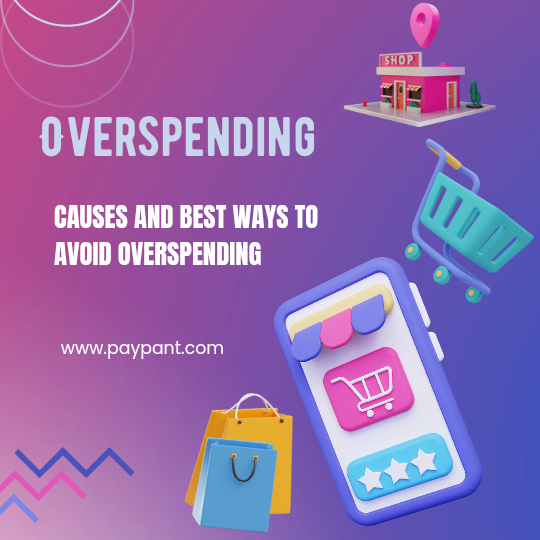
The inflation period is not the time to be too hard on yourself because you spent too much. Costs are higher than they used to be. In the US, prices of goods have gone up quickly over the past year, making it harder for people to keep up.
The cost of energy, gas, housing, travel, and education have all contributed to inflation that keeps going up.
As prices for goods and services keep going up faster than people’s annual net income, it gets harder for some people to keep spending the same way.
Read also, 9 Scary Money Statistics You Don’t Want to Be a Part of (and What to Do If You Are)
As the economy changes, so do the rates that the Bank of America charges to borrow money. The interest rates sometimes go up and sometimes go down.
Mortgages, lines of credit, and loans with higher interest rates mean people have less money to spend on other things. High-rising prices could cause overspending if the budget isn’t changed.
What Are the Signs I’m Overspending?
These few warning signs show that you are overspending

● You Don’t Have a Budget.
If you don’t track how much you spend, you probably spend too much. And if you’ve tried to stick to a budget but haven’t been able to, you’re spending more than you should. Set aside time to look at how you spend your money in detail so you can start new habits.
● Most of What You Earn Goes Toward Rent.
People often say that your housing costs shouldn’t be more than 30% of your monthly income. If not, you might spend too much. Depending on where you live, it could be very hard to get around rent issues.
PS: Remember that you can talk about anything. Your rent is one of them.
● On the Weekends, you Don’t Miss Grocery Shopping.
Most people wait until the weekend to go grocery shopping. But the best time to save is during the middle of the week, especially on things that don’t last long. Meat and dairy come to mind. Oh, and here’s one more way to save money at the store: don’t buy produce that has already been cut up.
● Your Favorite Thing to Do is Shop.
You might spend too much money if you shop online or go to the mall to kill time when you’re bored. Set a weekly limit on how much you will spend on shopping instead. That way, you can plan for impulse buys, which won’t ruin your financial plan.
● You Haven’t Looked at Your Subscriptions in a While.
Try to make it a regular habit to look over your subscriptions. Because it’s easy to forget which ones you don’t use anymore. So they spend more than they should.
11 Causes of Overspending and How to Avoid It
1. Your Inability to Resist Sales Discounts

Your inability to resist sales discounts is one of the huge causes of Overspending. Who doesn’t like discounts? Sales discounts are something that sellers know very well. Because of the discounts, they often tempt you to buy what is ridiculously cheap, that you actually don’t need.
Even if you don’t need the item at first, the word “discount” makes it too tempting to pass up, and you buy it. Who would want to resist a $1 channel bag or $5 airpods on AliExpress?
You should know that a discount isn’t always a real discount. There are times when the price of an item has already been raised, so when it goes on sale, it only goes back to its regular price. Also, a lot of discounts may also be a way to push out aging & unsold products.
Some offer discount packages in exchange for a minimum purchase. You have to buy x items because you want the discount. When there are many sales, one way to avoid spending too much is to decide ahead of time what you want to buy, and importantly, why you want to buy it. Remember that veering off your priority list may not be the best.
Setting a budget for shopping needs is another way. You can use the money you’ve allocated for the month’s as long as it hasn’t all been spent. But you know you’re done shopping for the month when you’ve spent all your money. This is not to say you shouldn’t take advantage of sales discount, however, knowing when you already started overspending.
Related: How Much Should You Spend on Hobbies: A Simple Guide
2. Lack of Financial Discipline
It is plain and direct; you must have some financial discipline in your life to restrict your expenditures and not get caught up with overspending. We sometimes dismiss such things as minor or inconsequential, although they are incredibly important.
The goal is not only to create a budget but also to stick to it and live by it. The whole goal of a budget is to bring some discipline into your life, and for that to happen, you must follow it.
Budgeting is one of several methods for achieving financial discipline, and it is necessary to avoid overspending. If you do not live on a budget, you will not know how much you can spend without going into significant debt.
Making a budget is the beginning of financial discipline and will help you deal with the causes of Overspending.
Related: What Is A Financial Safety Net? And Why Is It Important?
It is one of the most serious issues that individuals encounter, and it is quite tiresome, yet we must all grow up at some point.
You should consider every penny; to do so, you must understand how to create a budget. If you are not a math person, you may want to use apps like Digit, which does the arithmetic for you and speeds up the process.
The goal is not only to create a budget but also to stick to it and live by it. The whole goal of a budget is to bring some discipline into your life, and for that to happen, you must follow it.
3. Impulsive Spending
One of the big causes of Overspending is that people buy on impulse. Shoppers make 76% of shopping decisions while they are already in the store. As a result, 57% of shoppers spent more money than planned.
The reason for overspending is that stores’ decisions depend on things that can change at any time. A hungry shopper is more likely to buy more food than they need and try to explain why they did so.
One way to stop spending on a whim is to plan. A list of things to buy isn’t enough. Make a budget to ensure you don’t spend more money than you planned. Some shoppers only bring the exact amount of cash they plan to spend, so even if they want to splurge, they don’t have enough cash.
4. Underestimating Your Expenses
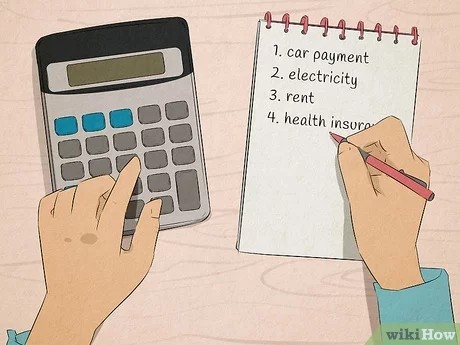
People often spend too much because they don’t consider small costs enough. Big monthly costs like rent, car payments, and utilities are easier to track in your head.
But the little things like going out to eat, buying coffee or snacks, or even paying for media online without even getting out of bed are a big reason why people spend more than they should (compared to going out for a movie, which mentally registers as an expense).
Underestimating your expenses is another way that making a budget, even for “small” expenses, can keep you from wasting money on things that tend to slip through the cracks.
Read also, 13 Reasons To Track Your Expenses And Control Your Spending
5. Having Zero Money Goals
Another common reason people overspend is that they don’t have a strong reason for making financial decisions.
This is often called your “why,” for spending, which is a very important part of making money.
So, one of the best ways to fight the urge to spend money is to find a reason that makes you want to save money even more. Keep creating more categories in your budget that requires more savings.
For example, what if your financial goal is to give your family safety and financial freedom? Then, whenever you want to spend money on something you don’t need, you will have to convince yourself that it’s more important than your family.
But that’s not the end of it! Your financial goal could be to save enough money to go anywhere in the world you want. Or, maybe your goal is to save enough money so you can quit a job you hate and start working in your dream field.
Whatever it is, the stronger your reason for making financial decisions, the less likely you will spend more than you need to.
Don’t miss the 45+ of The Best Apps For Saving Money
6. Credit Card Spending
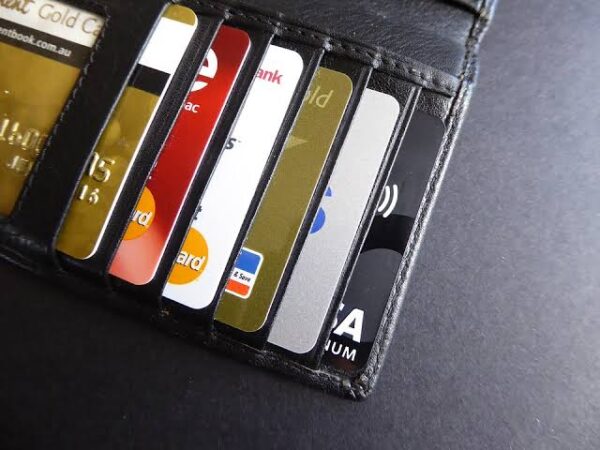
When used right, credit cards can be a very useful tool. In the early days of these cards, you usually had to pay off the whole balance every month.
Paying off the balance was helpful because you could buy things without using your own money. At the end of the month, you could pay it all back.
This arrangement was like a short-term loan with no interest. When used the way it was, paying the whole balance at month’s end can be a powerful way to manage your money.
The problem comes when you start carrying a balance from one month to the next. If you buy something for $200 with your credit card and can’t pay it back in full at the end of the month, you’ve started a slippery slope. It might start well, and you might tell yourself you’ll have enough next month, but most of the time, that doesn’t happen.
Related: How to Cancel a Pending Transaction on a Credit Card, Debit Card, and PayPal
Why Reducing Credit Card Spending is good for Your Finances
For example, if you have less debt, you’ll have fewer payments to make each month and more money to save and invest.
In the same way, the less you spend on credit cards, the less you’ll have to keep track of, and the less likely you are to miss a payment or spend too much.
Even more important, if you never use a credit card to buy things, you never have to worry about getting into high-interest debt.
If you can’t stop overspending, stopping to use credit cards is one of the best things you can do for your finances.
This period is when the hefty card interest rates start to bite. The card company makes the minimum payment due a very small amount, implying that you can afford to make the payment; however, if you continue to pay only the minimum, you’ll end up spending the next 20 years paying off that original purchase and spending more on interest than the original item’s cost. That is not the way to amass wealth.
See also, How to Change Your Credit Card Due Date
7. Giving in To Peer Pressure

It’s fine to hang out with friends and do fun things to make friendships stronger. But if you spend too much because of a friend, you might want to think again.
One common example is when people go out to eat together. A friend chooses a pricey place to eat. You lose your appetite when you look at the prices on the menu. But you can’t do that if you don’t order any food.
After eating, friend A asks if the bill can be split in half. The other friends don’t say anything. If you are the only one to object, people may look down on you or start regarding you in a grey light.
How Giving in to Peer Pressure Causes Overspending
We often try to make a good impression on people by what we wear. We do this to be liked and praised more by people. It is by far the most dangerous trap you could ever fall into.
Whether you buy a shirt that you don’t need, a shirt that is too expensive, or a car you can’t pay off, you will always spend more than you should. Peer pressure is a very dangerous box to fall into, and it can be hard to get out of it.
You might spend money to impress someone, and that person might not do the same thing to you or even notice your efforts. Spending money to impress someone could continue until you run out of money. How do we stop it? That’s the question.
So, what is the answer to overcoming the peer pressure to spend? You can try telling them that you have other needs that are more important to you, like how you can’t go out to a fancy restaurant for a while because of other needs. Good friends will know what you’re going through.
Or, you can cut down on how often you go out to eat with them. You can say you have other things to do.
8. Easy Access to Cash
Remember when you had to go to the bank to deposit a paper check from your employer and then keep cash on hand or write checks? Those times are long gone, and most people can get to their bank accounts anytime or night. Having easy access to cash can be risky and cause overspending.
When you had to make sure you had enough cash on hand or balance your checkbook every day, spending money meant you had to plan and do some simple math.
Now, you just swipe your debit card like you would a credit card, and the money is taken out of your account electronically. When you don’t give someone cash or a check for a purchase, it can feel like you aren’t spending any money. Try using cash to get a handle on your spending.
9. Prioritizing Immediate Satisfaction Versus Long-term Benefits

Prioritizing instant gratification over long-term benefit is one of the causes of Overspending. We are predisposed as humans toward our current selves and attaining what we desire right now. However, the desire for quick gratification often means we focus less on future gain.
We’re more concerned with the here and now than the financial gains that will be reaped in the future. We’re already predisposed to do what feels nice in the moment.
The reason is that the existing cost of delayed satisfaction can be painful, which isn’t particularly compelling from a behavioral standpoint. As a result, we only make decisions that make us feel good at the moment.
How Lack of Financial Priority Affects Retirement Goals
Zero financial priority is a major reason it is more difficult to begin early retirement savings. Retirement is simply so distant in the future, but there are various things, services, and opportunities that feel much more achievable in the present, and that’s often where we put our money.
Let’s face it: buying something for yourself feels wonderful. We all appreciate receiving something new, whether it is a new pair of shoes, the latest video game, or even a decent book. As long as you don’t go overboard, there’s nothing wrong with a little splurge on yourself.
This is when having some “fun money” in your budget can come in handy. Set aside a little buck from each paycheck for emergencies like these.
You’ll feel good about your purchase whether you pay cash or with a credit card, but you’ll feel much better knowing that you won’t have to spend the next two years trying to pay it off with 20% interest.
See the Best and (Worst) Places to Keep An Emergency Fund
10. Emotional Spending And Boredom
One of the main reasons people spend money is because they give in to their feelings and make decisions based on them. People often spend a lot of time scrolling through online stores just because they are bored.
Endless scrolling through online shopping websites is another idea that falls under the umbrella of emotional spending. Ease of access to smartphones and shopping apps!
Smartphones and other technology have made it harder for us to spend money wisely, which we should try to do more often. People often buy when they are mad or sad. Simply put, it’s their guilty pleasure that makes them feel better.
This is awful because you aren’t thinking about your budget and aren’t making a wise choice. You’re doing yourself financial harm.
Try being productive or finding other ways to show how you feel to eliminate boredom or emotional spending (by talking). Buying is a short-term pleasure with many negative side effects and makes you feel stressed, so it’s a cycle. Emotional spending is how people get into large amounts of debt. Try getting a second job or getting into a hobby to fill your time.
11. Temptation
The huge term, but inability to resist temptation is one of the causes of Overspending. Everyone gives in to temptation, which is a big mistake, and before we know it, we’ve made a big mistake that may come back to haunt us. So, let’s skip the haunting and just stop it from happening in the first place.
Let’s say your coworkers invite you to the movies, but it’s not in your budget. Learn to say no. Fighting the temptation to spend on friends doesn’t mean you should stop making friends and just work.
Who would want that? You need to learn not to give in all the time. You could invite your coworkers instead, or you could go somewhere cheaper.
We often give in to a few “guilty pleasures” and then feel bad about it. Because of this, you need a budget to know what to do and when to do it.
You need to be able to find balance in your life without going too far or giving up all your friends, which is a terrible idea. So you have to try to stay in the middle, which you can only do by making a budget and sticking to it.
Best Ways to Stop Overspending
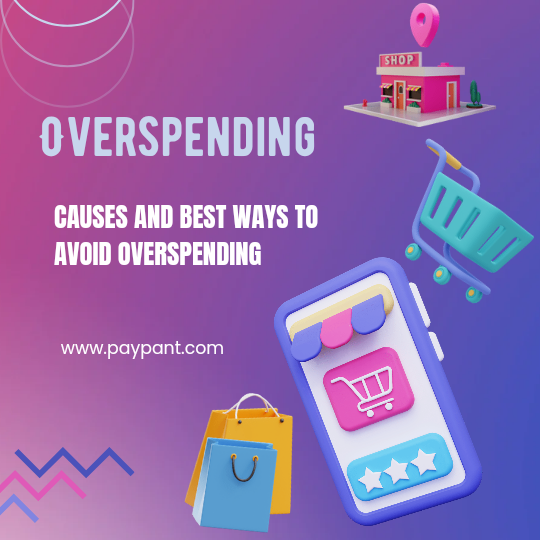
Now that you know what makes people spend too much money, here are some ways to stop:
1. Create a Budget
Spending a little bit is fine, but spending too much is bad for your money.
A good first step is to look closely at how much money you make and how much you spend. Seeing how much you spend too much on clothes, technology, and other luxury items could be the wake-up call you need.
Make a spreadsheet or use a budget planner to write down everything you earn and spend. Next, decide how much your salary will go to each spending category.
People who tend to spend too much can use the 50/30/20 budgeting method because 30% is set aside for fun things like shopping. 50% is used to pay for things that must be bought, and 20% is saved.
The most important thing about budgeting is that you can’t spend any more money in a certain area until the next month.
Related: How to Make a Personal Budget in 6 Easy Steps
2. Start Tracking Your Spending
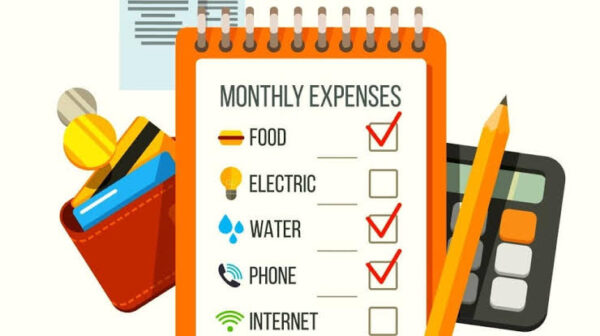
Even the smallest purchases can add up to a lot, and by the end of the month, we may have a small bank account and a lot of buyer’s remorse.
Keeping track of your spending is the key to making a good budget because it makes you answerable for every dollar you spend. Once you know where your money is going, you’ll be able to choose how to spend it more wisely and find places where you can cut back.
Many start by keeping track of their big purchases, but it’s just as important to keep track of their small, everyday purchases. A morning latte, lunches out, a lottery ticket, or a magazine at the grocery store checkout line can add up to more than you think, and they can have a big effect on our budget.
If you can save just $5 a day, the cost of your morning coffee or bagel sandwich, it will add up to more than $100 a month.
See also, 13 Reasons To Track Your Expenses And Control Your Spending
3. Set Short-term Financial Goals
Setting goals that can be reached is one of the best ways to keep from spending too much. Setting these short-term money goals is a great way to keep yourself motivated as you change your spending. For example, if you applied for a personal loan online, a short-term goal would be to pay back all the money by a certain date.
These goals will help you remember why you’re cutting back on spending and making sacrifices. Make sure you have SMART goals (specific, measurable, attainable, realistic, and can be achieved within a specific time).
4. Don’t Give in to Emotional Spending
People often turn to spending too much to deal with their stress. Even if you’ve had a bad day, that doesn’t mean you deserve those new earrings. Shop when you’re feeling good, not when you’re tired, hungry, stressed, etc. Don’t go shopping when you’ve had a bad day or think you deserve it. You should be able to make your own money more than you should get a new pair of shoes.
5. Start Automating Your Savings
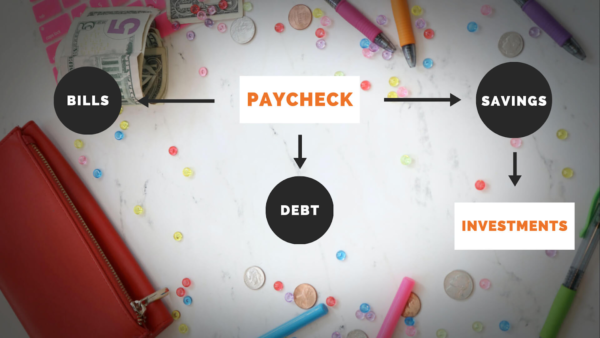
You might believe you have more money than you do if you quickly check your bank balance on your phone and see that you got paid.
This illusion is because you can’t spend all the money you plan to save for retirement, your kid’s college, your first home, etc. But we all know how things turn out. First, we spend, and then we save. Rinse and do it again.
Because we spend before we save, automating your savings is one of the best things you can do for yourself. First, ensure you’re putting money into your work’s retirement plan. Second, set up a direct deposit at work so that some of your money goes into a separate account.
I set up a transfer from my main checking account so that I wouldn’t spend too much. Every time my paycheck goes into my main account, a smaller amount goes to my flexible spending account. This spending decision made a big difference because I could physically separate the money I wanted to spend from the money I needed for rent and groceries every month.
If you make those changes, you’ll be much better off financially, even if you still find yourself living “paycheck to paycheck,” since you’ll be saving a good chunk of your paycheck.
See also, How to Set Up Automatic Savings and put your savings money on Autopilot
6. Use Debit Cards instead of Credit Cards
Using a debit card is a great way to stop yourself from spending more than you have. With a debit card, you can only spend as much as you have in your checking or spending account. If you have $5, that’s all you can spend. Keeping track of how a purchase will affect you immediately will help you say “no” to some purchases you don’t need.
7. Forget Your Credit Cards both Literally and Figuratively
Take only the cash you think you’ll need to the mall or grocery store and leave your credit cards home. You don’t need to bring your credit cards unless you are sure you will use them to buy something and have a plan to pay them off. By reducing your credit card spending, you won’t be tempted to use the card to buy something on the spot, which is often the quickest way to get into debt.
Having your credit card information saved on your online shopping profile is convenient, but it also makes buying things on the spot easier. All it takes is one click, and you’ll have a few more pairs of shoes but $100 less. When you delete your credit card numbers, it’s a little harder to buy things, and in the time it takes you to find your wallet and pull out your credit card, you might decide that you don’t need that item.
If you know your credit card numbers by heart, you should cancel your cards and ask for new ones. Then, go to your favorite shopping sites and delete your saved information so you won’t be tempted to buy something with just one click.
8. Find Alternative Ways to Make You Happy Rather than Spending

Don’t let emotions drain your wallet. Don’t go to the mall if you’re sad or stressed and need a pick-me-up. Instead, take a walk, read a book, listen to music, or do something else you enjoy. The best way to stop overspending is to avoid temptation, and there are many ways to stay away from the store without spending too much of your hard-earned money.
Related: 21 Ways To Make Budgeting Fun
9. Budget For the Unexpected Expenses
One way to avoid overspending is to make and stick to a budget. If you give yourself some space, you will find it easier to budget for unexpected expenses. If your finances allow it, try setting aside an extra $100 per month for unexpected costs. Even if you can’t budget an extra $100 a month, just starting somewhere will help you get on the right track. So, if you forget to budget enough for a special event, you’ll still have enough money in your budget to cover it.
See also, Budgeting for Unexpected Expenses, Best Ways to Avoid Disaster
10. Try a No-spending Challenge
Try a no-spending challenge if you want to stop spending more than you should. For example, you could:
For example,
- For 60 days, don’t buy any clothes.
- Only pay for things that you need, like groceries and bills.
- Instead of going out to eat, cook at home.
A spending-free challenge can help you figure out where you spend too much money. When you know what sets you off, it’s easier to figure out how to avoid them. People who spend too much can find these challenges hard, but turning them into a game can help you stay on track. You could even add a penalty if you broke the rule, like putting an extra $10 in your savings pot or giving it to a good cause.
Related: 10 Easy No-Spend Challenge Ideas to Save a Ton of Money
11. Try Something Different or New
Instead of shopping when you’re bored, try something new and interesting. You can join a book club, start a healthy habit like running or yoga, or do things you used to do but don’t have time for anymore. Hobbies can be a great way to keep life interesting and fun without buying something new all the time.
12. Always make an Expenses List and Wait a Few Days Before Spending
Instead of spending money on impulse, think about what you want to buy for a day or two. Waiting a few days before spending gives you time to consider whether you need the item before deciding to buy it. Write it down and wait until next month to buy it. So, you can add the money you’ll need to buy what you want to your monthly budget. One of the best ways to stop spending too much is to give yourself more time to decide what to buy.
See also, What is Impulse Spending(Plus 10 easy steps to control it)
13. Give Every Dollar You Earn a Job

Try to get your accounts to zero if you tend to spend more than you have. No, we don’t mean to spend all the money in your account until it’s empty. Instead, find a place for every dollar in your budget. That way, you won’t be tempted to buy things you don’t need because you think, “I have the money, so I’ll spend it.”
Putting your money into tinier units helps you figure out how to spend it in the best way. For example, if you have $500 in your checking account, you might think you have a lot of money and spend $100 at one of the best restaurants in town and another $100 on a new wardrobe. But when your rent, utilities, and car payment come due a few weeks later, you find that you don’t have enough money.
See also, 40+ of the Best Weekend Jobs to Make Extra Money in 2022
How you Avoid Overspending by Making your Money Work for You
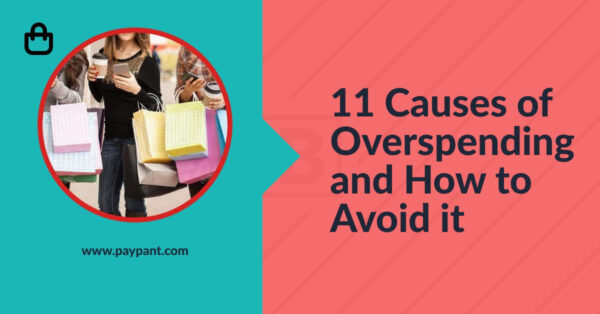
Tell your money where to go as soon as you get paid to keep from spending too much. First, pay all your bills, and then move the rest to other accounts, like a savings account or a retirement fund. If you give each dollar a place to go, you’ll be less likely to spend your whole paycheck. To make things easier, you can set up an automatic transfer on payday to split your paycheque into different accounts, so you won’t be tempted to spend it.
Your financial awareness grows when you decide what you want your money to do and where it should go. And being aware of how, where, and when to spend your money goes a long way toward helping you make better decisions about your money.
14. Clear Your Saved Shopping Details Online
The internet is another spending factor that makes it too easy to spend money. You can now save your credit card and debit card information on a website and pay for something in seconds. You don’t even have to find and type in your card number. This kind of online shopping ease can make it feel like you’re not spending anything when you just click a button and get new things.
Unfortunately, more and more people are spending too much on the Internet. If you keep buying things you can’t afford, especially when browsing on your phone, you might want to remove your card information from your accounts.
15. Be Creative With Spending: Learn to Refurbish or Flip Instead of Buying

Instead of giving in to the ripple effect and buying a new table to go with your new couch, you could try refinishing the old one. Even if you still think a different lamp would look better in the room, you might be able to find one at a thrift store or try replacing the lamp shade. With a little work and a can of spray paint, I’ve found cheap ways to give some of my old things a new look. Different ways of looking at things can be fun, creative, and save money.
If you plan to do it, splurging once in a while isn’t a bad thing, but knowing why we often overspend and how to stop it before it starts will go a long way toward helping you build better money habits.
Check out these 40+ Easiest Things to Flip for Profit
16. Always Plan Ahead Financially
We can’t stress enough how important it is to plan ahead financially if you want to avoid the causes of Overspending. Plan and know exactly what you need and what you want. Most people spend more than they need to because they don’t know what they need. So, you should look at what you need and write it down.
You don’t want a quick trip to the store to turn into a big bag of things you don’t need. You should plan to buy as many things as you can. How and where you spend your money will be very different if you plan.
How to Understand Your Spending Triggers

Most of the time, figuring out how to stop spending money means figuring out the emotional and mental triggers that make us spend. If you get rid of these things, you won’t be tempted or able to spend too much. So, before you leave, keep these things in mind:
● Time of Day
Do you find that certain times of the day give you more energy? If so, go shopping when you feel you have more energy and less stress. You’ll make better spending decisions and think more clearly when you’re not stressed out.
● Environment
Are there places where you want to spend or feel like you have to spend just because you’re there? Craft fairs, shopping malls, home shows, and even vacations are all good examples of times when you’re more likely to buy something on the spot. So, avoid being tempted by not going to these places or only bringing a small amount of money.
Also, if you have a favorite store and find yourself wandering through the aisles looking for good deals, do everything you can to avoid going there as much as possible. If you have to go to your favorite store, don’t spend your own money or credit cards if you can.
● Mood
Moods and mental states might alter our energy resources, making us more susceptible to impulse purchases. For instance, if we are sad, stressed, or anxious, we may seek retail therapy to make ourselves feel better. Instead of going to the mall or your favorite online shopping site, go to the gym or the park. Going for a walk or performing some exercise will help you feel better.
I was guilty of mood spending. There was a time shopping was my favorite thing to do, and whenever I felt low, I shopped to feel good. I learned that as much as I need to feel good, it shouldn’t always burn holes in my pocket. I learned other ways to snap out of a mood or mental state besides shopping. Channeling my energy to other mood boosters helped me deal with my overspending.
Your moods can tint your purchasing with rose-colored glasses, making everything appear to be a steal. What’s important is that you identify the moods that affect your spending.
How To Stop Spending Money
A problem with spending too much should be dealt with in small steps. Small, easy-to-handle changes made over time are more likely to last. Instead of just relying on willpower, it might be better to set specific goals and build a foundation with an emergency fund and a budget.
A study done in 2021 found that these strategies for financial self-control helped people stop spending too much or save more:
- Use a budget plan to help you save for retirement.
- Use a shopping list to plan what to buy.
- Think about why you want to reach your financial goal and follow it through.
- Use cash instead of cards to pay.
- Keep track of how much you put in your savings each week.
- Use a savings account that doesn’t let you take money out early.
- When you go shopping, stick to a budget.
- Expect to regret what you buy.
- Set clear goals for saving.
- Keep large money denominations as your main source of cash.
- Make it hard to access your savings money.
Learning How to Stop Overspending is Hard, But It Is Possible

Stopping excessive spending and changing spending patterns requires time and effort, and the temptation to use credit cards will inevitably arise. Don’t be so hard on yourself; it’s normal to experience setbacks when attempting to change harmful behaviors. Once you’ve learned to budget, established some financial goals, and put safeguards in place, you’ll be well on your way to becoming a frugal consumer.
Bottom Line
There are many reasons why people spend more than they should. Overspending is a big problem that needs to be fixed. We are often drawn to ads, sales, and discounts, but we also need to keep our budget in mind. Most of the time, spending too much is just a sign of a bigger problem.
Many things can cause it, like not living on a budget, not having a financial goal, or just being bored. And taking the time to figure out what’s causing the problem could be one of the best things you ever do for your money.
No one can buy everything (except maybe Jeff Bezos), so you have to be smart about spending your money and not be unaware of it.
You can only be financially successful if you are responsible and know when to stop. The faster your money grows, the sooner you stop spending too much and start living on a budget. In the end, you might be able to buy ten of the things you wanted in the beginning. It takes a lot of time.
Don’t miss these 17 Easy and Practical Budgeting Tips for Beginners
Frequently Asked Questions (FAQs)
Q: How do I stop overspending?
The different ways you can stop overspending are:
- Intentionally shop in the supermarket.
- Improve your skills in money management.
- Don’t just give up on eateries.
- Stick to Purposeful online shopping
- Stop trying to solve problems by getting new items.
- Clean up your social media feeds that suggest online shopping.
- Create a budget and stick to it.
- Discover your “why.” for spending
Q: Can not having enough savings lead to overspending?
A recent survey by Bankrate found that 20% of Americans don’t have any savings, and another 21% save less than 5% of their paychecks.
That means that if the car breaks down or the roof needs to be fixed quickly, they have to scramble to get a loan, use a credit card, or take money away from things like food or utility bills, which are more important.
- Overspending tip: Save 10% of your take-home pay every month. You’ll have saved up a little more than one month’s salary at the end of a year, which should be enough for most short-term situations.
Q: Is it normal to cure loan debt through overspending?
If you carry a balance on your credit card every month or have a never-ending amount of student loan debt, adding a little here and there may not seem like a big deal. It might even feel like a valuable investment: A study found that young people between 18 and 29 with credit card and college loan debt also had a higher sense of self-worth and more control over their lives.
- But here’s the catch: that feeling went away as people got older and probably realized how much and how long it would take to pay off that debt.
Q: How do you address a spending problem?
Start with what interests you the most and where you want to begin:
- Recognize Your Spending Triggers.
- Keep track of your spending.
- Stop relying on credit cards and stick to cash.
- Forget about your credit cards, both literally and metaphorically.
- Set short-term financial objectives.
- Learn How to Make a Budget.
- Make every dollar you earn count.
Q: How do I avoid spending unexpected cash?
You Get Money Out of the Blue? A bonus at work, overtime pay, a tax refund, or money for your birthday. You weren’t planning on getting that money, so why not take it? Wrong! It would be easy to spend this “unexpected money,” but once it’s gone, it’s gone for good. Why not use it to your advantage instead?
How to stop spending money you didn’t plan to: Give yourself a small treat and put the rest of your money to work. Use it to pay your credit card bill faster, make an extra payment on your student loan or mortgage, or start or add to an emergency fund.
Q: What are the effects of overspending?
Overspending and living beyond your means can negatively impact your financial health, resulting in A debt cycle that can be difficult to break due to interest owed. An impossible atmosphere in which to save for retirement while trying to keep up.
Q: Can lifestyle maintenance lead to overspending
When someone has been living a certain way for a while and then finds themselves in a bad financial situation, it is hard for them to change. They feel like they have to keep living the way they are used to, even if that means taking on more debt and filing for bankruptcy.
Q: I was poor as a child and used to lack. Can this have caused my overspending?
Like many underprivileged children, you may feel compelled to squander all you can get your hands on as soon as possible. Perhaps there is a concern that the money will be taken away if it is not spent right soon. You must understand that once something is yours, it truly is yours. And saving money is the best way to make money work for you.
Q: How do you know if you are overspending?
Making the minimum payment on your credit cards signifies spending more than you earn. Making the bare minimum payment each month will hold your debt at bay but will do little to reduce the balance.
Q: Spending money gives me power; how do I deal with this?
Many people feel more powerful when they spend money. Whether they hand over a wad of cash or pull out a gold card to charge money, spending a lot of money makes them feel like they have a lot of power.
Most people think it’s crazy to spend $60 on a haircut, $150 on a designer dress, $75 on a new pair of shoes, and maybe $90 on a facial every other week. But for many people, it gives them a sense of being important. It makes them feel that the world cares about them. Paypant.com recommends that you realize a very important financial tip: “the more money you have in your bank account, the more powerful you feel”
Q: How Do I avoid overspending when I go on vacations?
On vacation, you can do whatever you want and don’t have to follow the rules. Spending money on things you wouldn’t normally buy is way too easy. But remember that vacations are short, and buying overpriced souvenirs with credit cards will feel like a bad idea when you get home.
Set a limit on how much you can spend on shopping or souvenirs while on vacation and stick to it. Only bring one credit card with you in case of an emergency, and leave it in the room safe or hotel safe. Don’t carry it with you (place it in a sealed, padded envelope to avoid tampering). Find a grocery store nearby and buy snacks and drinks to keep from having to pay mini bar prices.
Related: 30 Budget Busters That Will Hinder Your Savings
Q: How do I say no to Overspending?
Some people just can’t say no to spending, whether a toddler asking for the latest craze item or a spouse demanding the latest computer game. Even if they cannot afford to say yes, they experience a sense of failure if the money is not available to meet the other person’s needs. These folks will make it happen no matter what, even if it means going to bankruptcy court.



